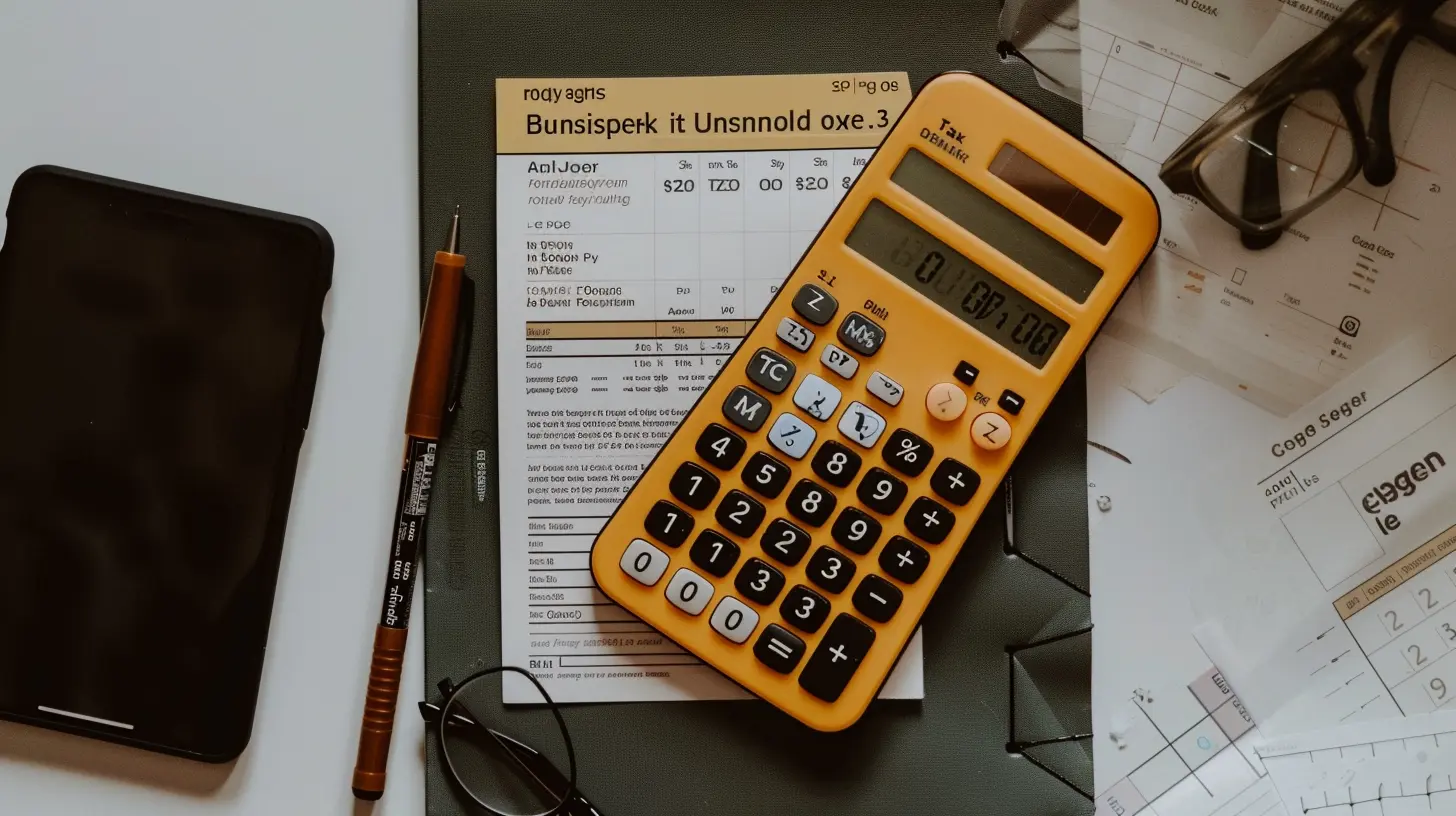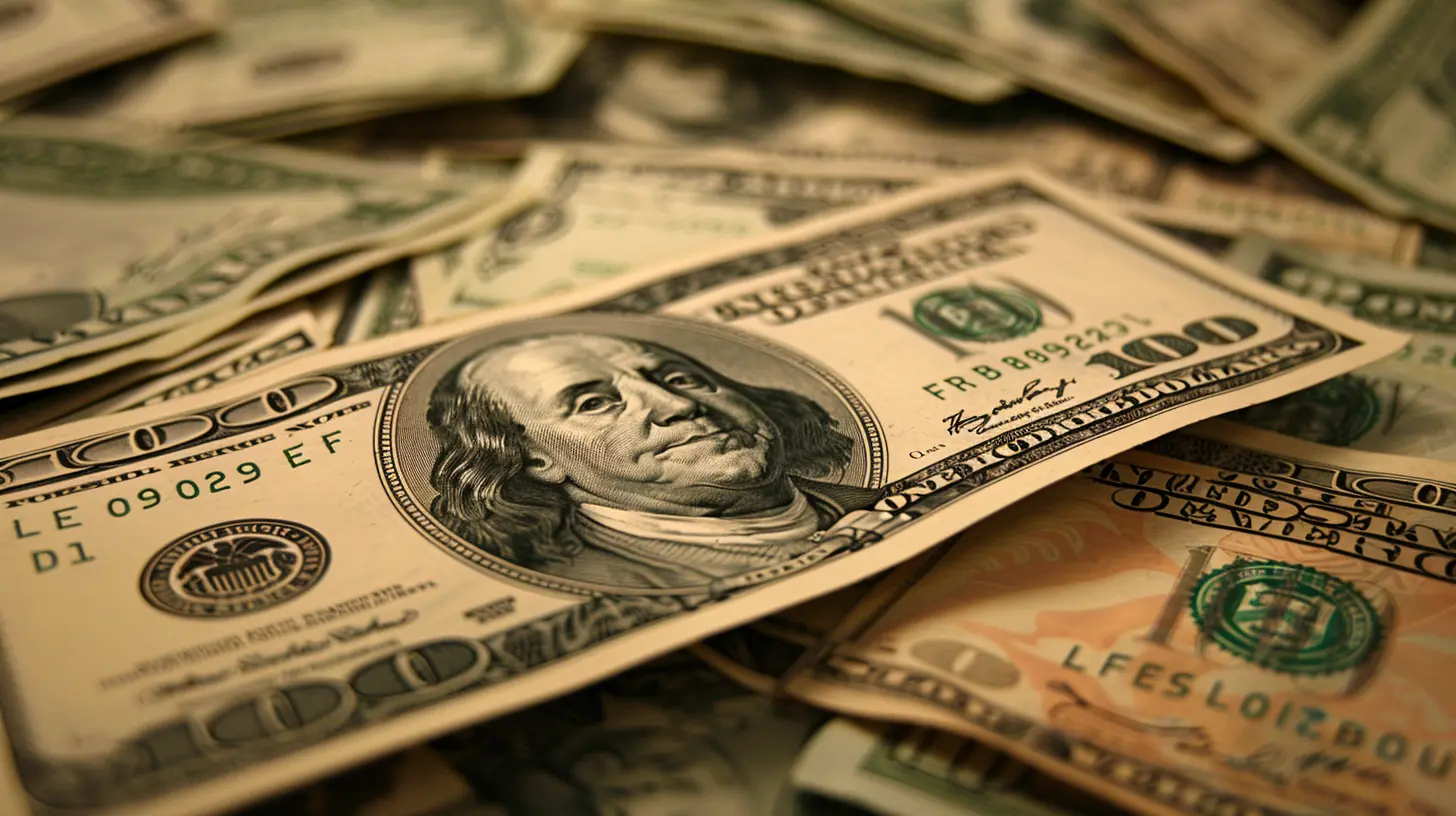Are You Taking Full Advantage of Business Expense Deductions?
6 August 2025
Let’s be honest—taxes are no one’s favorite subject. But if you're a business owner, freelancer, or side hustler, one question you should always be asking is: _“Am I squeezing every possible dollar out of my business expenses?”_ Because here's the deal—every dollar you don’t deduct is taxed like it's profit, and that’s essentially like handing free money to the IRS.
So, are you taking full advantage of business expense deductions? Most folks aren’t. They’re either unsure what's deductible, afraid of raising red flags with the IRS, or just don’t feel like digging through old receipts. But that procrastination could be costing you thousands every single year.
Let's break down how to grab as many of those legit deductions as possible—without turning your tax prep into a full-time job. Ready? Let’s dive in.
What Exactly Are Business Expense Deductions?
Think of business deductions as your ultimate tax loophole—but legal and IRS-approved.In simple terms, a business expense deduction is any cost you incur while running your business. If it’s ordinary (common in your industry) and necessary (essential for operating), it’s probably deductible. These expenses reduce your taxable income, which means you owe less tax.
Let’s say you made $100,000 in revenue, but spent $30,000 on business-related costs (everything from software to travel). You’re only taxed on $70,000. That’s a big deal!
Why Many Business Owners Miss Out
Honestly? Most people aren’t using deductions to their full potential. And there are a few common reasons why:- Fear of audits – Many business owners play it safe to avoid IRS scrutiny. But being cautious doesn't mean losing out on legit deductions.
- Poor recordkeeping – Missing receipts and vague expense tracking can make it tough to claim deductions.
- Not knowing what qualifies – This is a big one. Some folks don’t even realize what they can write off.
The result? More tax owed, and less money in your pocket.
The Magic Formula: “Ordinary and Necessary”
The IRS uses two main words to define a deductible business expense: ordinary and necessary. So before you add anything to your deductions list, ask this:> “Is this something others in my line of work would reasonably spend money on to keep the business running or growing?”
If the answer is yes, you’re probably in the clear. No, it doesn’t mean you can deduct your daily Chipotle runs (unless you're buying lunch for a client). But it might mean your Zoom subscription, domain name, or even that ring light for your YouTube channel are fair game.
Common Business Expenses You Should Be Deducting
Let’s get specific. Below are some business expense categories many people miss or under-use:1. Home Office Deduction
Got a space in your home that’s _exclusively_ used for work? Great news—you can deduct a portion of your:- Rent or mortgage interest
- Utilities
- Homeowners insurance
- Repairs and maintenance
Even if you’re working out of a spare bedroom or a tiny corner office in your living room, if it’s a dedicated workspace, you’re eligible. Just be sure it’s not doubling as your Netflix lounge.
2. Office Supplies and Equipment
Basic stuff like pens, paper, printer ink, and folders? All deductible.And if you buy a new laptop or second monitor for your business, you might be able to write that off too—either all at once or over a few years via depreciation.
> Tip: Keep receipts and make notes about why each item was purchased.
3. Business Meals
You can deduct 50% of meals if they’re with clients, prospects, or other business contacts. Just make sure:- The meal has a clear business purpose (no, hanging with your buddy doesn’t count).
- You keep the receipt and jot down who you met with and why.
Meals during business travel are also a legit deduction. Just don’t go overboard ordering fancy wine if your income isn’t keeping pace.
4. Professional Services
Hiring an accountant? Paying a lawyer to review contracts? Subscribing to a virtual assistant service? All deductible.Professional services that help you run or grow your business are tax-friendly expenses.
5. Marketing and Advertising
Running Facebook ads? Printing business cards? Paying for a logo redesign?All of it qualifies. Any money spent promoting your business is tax-deductible, so track every dime you invest in growing your brand.
6. Travel Expenses
Business travel is another gold mine of deductions. This includes:- Flights
- Hotels
- Car rentals
- Uber/Lyft rides
- Meals on the road
- Conference tickets
Just make sure the trip is primarily for business. That beach detour? Probably not deductible.
7. Software and Subscriptions
Think Zoom, Canva, QuickBooks, Mailchimp, or any tools you pay monthly or yearly to run your business. These add up quickly—and they’re 100% deductible if they’re business-related.8. Education and Training
If you’re taking a course, attending a seminar, or buying industry-related books—that’s business development, baby. And yes, you can write it off.9. Insurance
Business insurance premiums, liability insurance, and even part of your health insurance (if you’re self-employed) may be deductible.Make sure to separate personal insurance from business use, though—this is where a good accountant can help.
What About Mileage and Vehicle Expenses?
If you use your car for work (think sales calls, client visits, or deliveries), you can deduct that mileage. You have two options:1. Standard Mileage Rate – This is the easiest. For 2024, it’s 65.5 cents per business mile.
2. Actual Expenses – You track all the costs (gas, maintenance, depreciation, etc.) and deduct the business-use percentage.
Either way, keep a mileage log or use a tracking app like MileIQ to stay on the IRS’s good side.
> Side Note: Commuting to your regular workplace doesn’t count. Only business-related travel qualifies.
Depreciation: The Long Game Deduction
Some expenses are too big to deduct all at once. That’s where depreciation comes in.When you buy big-ticket items (like equipment or vehicles) that last more than a year, the IRS often wants you to spread out the deduction over several years. This might sound frustrating, but it can actually help smooth out your tax bill year over year.
Don’t Forget About Start-Up Costs
Just getting your business off the ground? Congrats! You can deduct up to $5,000 in startup expenses like:- Market research
- Legal fees
- Business formation costs
- Initial advertising
If your early-stage costs go over that limit, you may be able to amortize the rest over several years.
What Doesn’t Count? Avoid These Traps
Let’s talk about what’s not deductible—because the IRS has limits, and pushing the boundaries can backfire.- Personal expenses – No, your Netflix subscription isn’t a write-off unless you're a film critic.
- Clothing – Unless it’s a uniform or costume you can’t wear elsewhere.
- Fines or penalties – Parking tickets and late fees? Nope.
- Commuting costs – Driving to and from your main place of work is considered personal travel.
When in doubt, ask yourself: _“Would I be spending money on this if I weren’t in business?”_ If the answer’s no, it’s probably deductible. If it's yes, it's probably not.
How to Stay Organized (and Stress-Free)
Here’s where most freelancers and small biz owners trip up: great intentions, bad record-keeping.Your expenses are only useful at tax time if you track them properly. Here’s your cheat sheet:
- 📂 Keep receipts (physical or digital)
- 🧾 Use accounting software like QuickBooks or Wave
- 🗓️ Log your business miles regularly
- 💳 Use a separate business bank account or credit card
- 🧠 Make small notes about each purchase (what it was, why it was needed)
Your future self (and your accountant) will thank you.
Consider Hiring a Pro
If you're making more than $50,000 a year from your business, it’s worth talking to a tax professional. Sure, it’s an added cost, but a good CPA can save you way more than they charge—especially when it comes to maximizing deductions and minimizing risk.They’ll also help you avoid rookie mistakes that could trigger an audit—or leave deductions on the table.
Final Thoughts: It’s Your Money—Don’t Leave It Behind
You work hard for your income, so why voluntarily give more to the IRS than you're required to? Taking full advantage of business expense deductions isn't about being sneaky—it’s about being smart. These are expenses you’ve already made to grow your business. The tax code is literally set up to reward that.So stop letting confusion or fear stop you from claiming what’s yours. Learn the rules, track your expenses, and work with a pro if you need to.
Every dollar you deduct is a dollar back in your pocket—and when it comes to small business, every dollar counts.
all images in this post were generated using AI tools
Category:
Tax EfficiencyAuthor:

Yasmin McGee
Discussion
rate this article
1 comments
Sablethorn Richardson
If you're not maximizing your business expense deductions, you're basically throwing money out the window. Stop leaving cash on the table—get savvy and claim what's rightfully yours! 💸✨
August 27, 2025 at 2:44 AM

Yasmin McGee
Absolutely! Maximizing deductions is essential for reducing tax liability and keeping more cash in your business. Don't miss out on what's rightfully yours!


